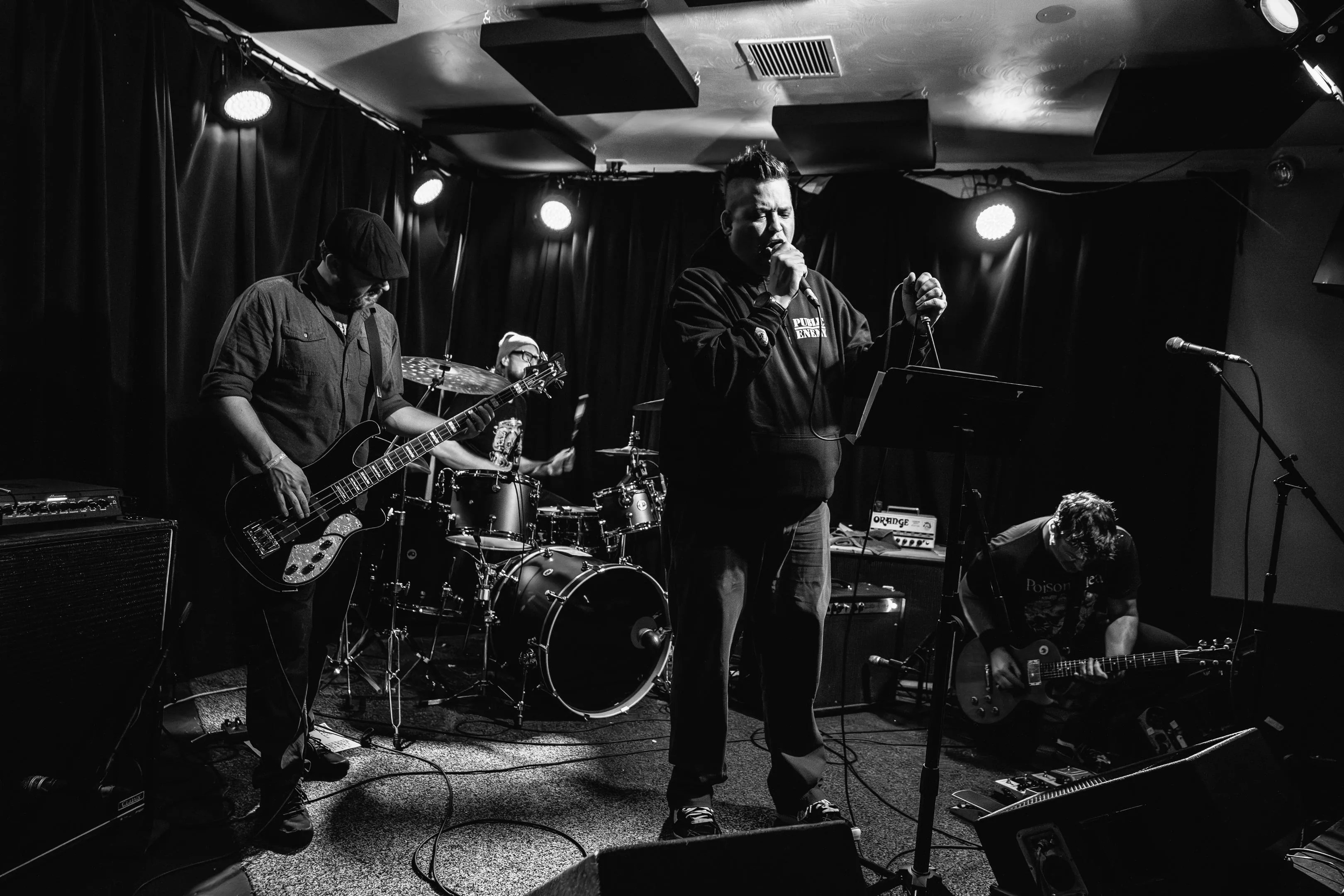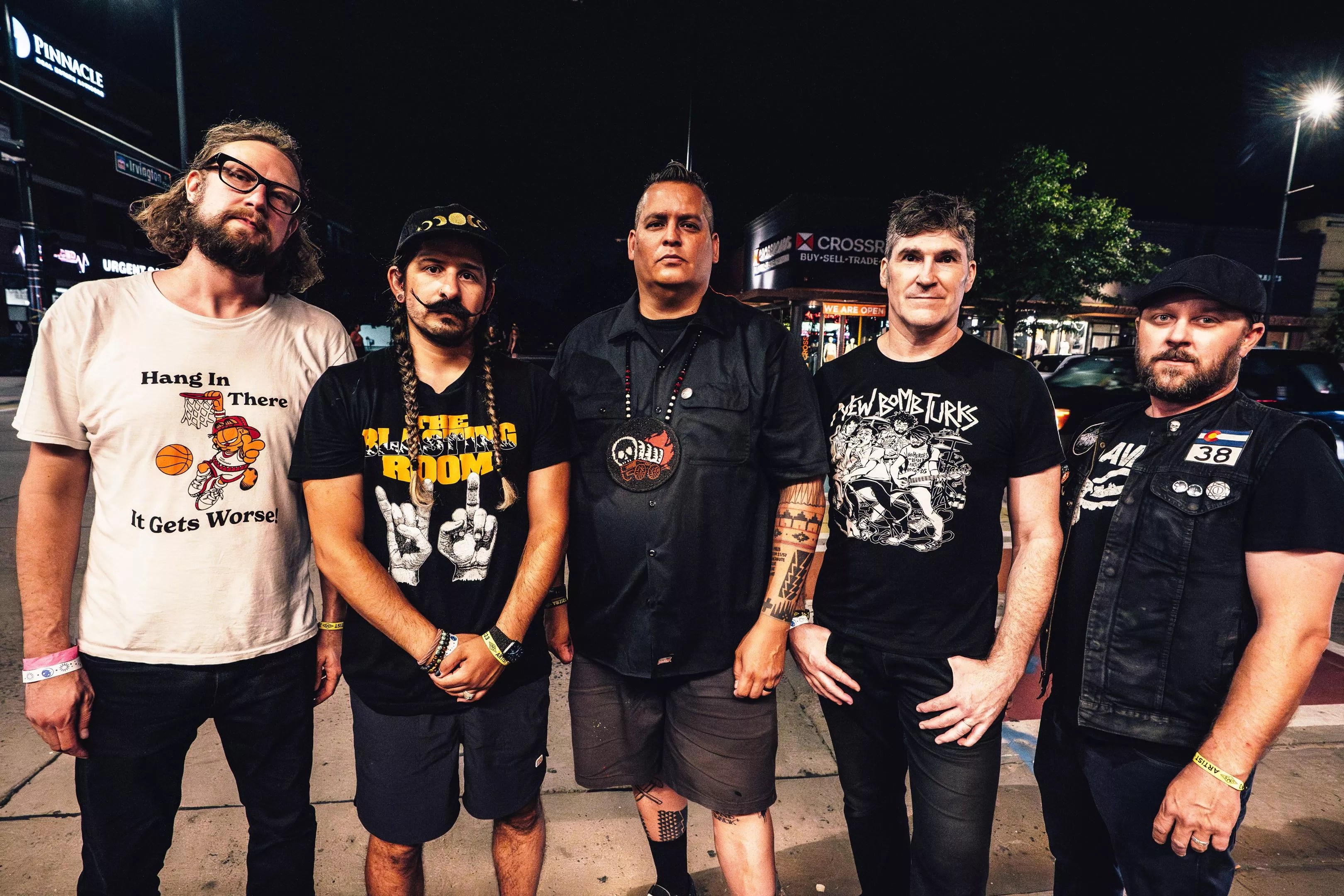
Jason Meyers

Audio By Carbonatix
With his new musical project, Dead Pioneers, Indigenous activist Gregg Deal wants to remind listeners that “We Were Punk First.” A nationally acclaimed visual artist and spoken-word performer, Deal recently filmed the band’s video for its single “Bad Indian” at Seventh Circle Music Collective, the DIY live-music space in west Denver. Following Dead Pioneers’ indie self-titled album release in September, the band performed at the Skylark in mid-January alongside Cheap Perfume and Elegant Everyone, and after just a few shows, Dead Pioneers is already generating serious local and national buzz.
“I accidentally started a band,” Deal says. Working with guitarist Josh Rivera and drummer Shane Zweygardt, friends from the local music and arts scene, Deal’s original plan was to simply integrate punk riffs with his spoken word for his performance-art piece The Punk Pan-Indian Romantic Comedy. But he inadvertently became a songwriter through that experience, and took the first step toward forming a band in early 2021 after meeting Lee Tesch, lead guitarist for the American-English punk band Algiers during an artist residency at the Atlantic Center for the Arts in Florida. While planning a poetry reading for the community, Deal and Tesch wound up in the studio and recorded a six-minute version of “Bad Indian.”
Back in Colorado, Deal shared that recording with Rivera and Zweygardt, and they quickly realized they might have something special. “As we tried to figure out next steps,” Deal says, “we got so caught up in it that I just started writing.” After raising enough money to bring everyone together in Fort Collins, Deal partnered with the Music District, which donated rehearsal space, and Dead Pioneers was born.
Adding veteran punk guitarist Abe Brennan, Dead Pioneers recorded its debut album in just two days at the Blasting Room, the Fort Collins studio founded by Bill Stevenson of Descendents. “It felt exciting, relatable and authentic, and while not everyone can sing, everyone can find their voice,” Deal recalls of the recording process. After its release, the album drew the attention of such industry veterans as Jello Biafra, the former Dead Kennedys frontman, who came to Denver to see the band’s January show.
Dead Pioneers’ authentic, raw spoken word over raucous power chords and heavy beats evokes such punk pioneers as Minutemen and Rollins Band. Opening with “Tired,” a scathing indictment of the relentless oppression of Native people, the album launches into the powerful “We Were Punk First,” a title originating from Native artist Walt Pourier, whose organization the Stronghold Society brings skateboarding to tribal communities to help kids avoid self-harm.
“That is such a dope line that had just been hiding on skateboard art for years,” Deal notes, “and I knew it had to be something.” The resulting song is short, hard and fast, with lines calling out white supremacy, challenging self-importance and decrying hipsters who try to commodify punk.
Meanwhile, the song “Bad Indian” challenges false, racist expectations of how Native people are “supposed to be.” The lyrics comprise actual conversations Deal has had, but the stories are also shared cultural experiences of Indigenous people being asked about “their Indian names” or being told “they speak real good for an Indian.” The video from Nerd Rat Media is a must-see, racking up more than 6,300 views on YouTube in one month. The powerful duality in the song, referencing Deal’s complex challenge of being Native while also “having an American experience,” is punctuated through images of Native dancers in traditional regalia circled by a mosh pit. The connection between punk culture and Indigenous advocacy is not unique, and Dead Pioneers is a new voice merging those cultural and musical influences.

Left to right: Shane Zweygardt, Josh Rivera, Gregg Deal, Abe Brennan and Dave Lamothe (not pictured – Lee Tesch).
Jason Meyers
The sharp social criticism at the heart of Deal’s lyrics draws from and renews the spirit of early punk. Deal believes punk’s political message is just as relevant today, maybe more so, as punk has become increasingly commodified. Challenging the standard of marketability, Deal says he felt like “punk was dying” after the ’90s and Nirvana, and something overshadowed “the things that need to be said.” Pushing the envelope by putting out edgy unfiltered music carrying messages of social justice is a return to the music he grew up listening to. The album contains two covers: “World Up My Ass,” by the Circle Jerks, and Minutemen’s “The Punch Line,” a song that just screams to be sung by an Indigenous person.
Dead Pioneers’ debut ends with the haunting “No One Owns Anything, and Death Is Real.” The song’s urgent environmental message calls out shallow materialist values against a backdrop of screaming guitars, almost wailing with the warning: “We told you this wouldn’t work.” Deal is a natural on stage and behind the mic, and it’s surprising that it’s taken till his forties for him to start a band. He recalls hearing producer Rick Rubin encourage artists to make art for themselves first, not an audience or commercial market, and Deal took that to heart. “I’m making this music because I want to make it,” he says. When that’s true, the authenticity will connect and resonate – and with Dead Pioneers, it does.
Gregg Deal has a compelling story to share, noting that it’s been a long journey – “like, a solid thirty years,” he says – from when he was a young Native punk growing up in Park City, Utah. “This is the band I wished I could’ve started,” he says. “These are the songs I wish I could’ve heard as a kid, and they are songs I’m glad my kids can listen to.” Drawing from such influences as Public Enemy, Misfits, Suicidal Tendencies and Rage Against the Machine, Deal has crafted an innovative and compelling sound. Rage, he says, was “arguably the most political punk band,” and the messages he found in punk were “so important to me, a young Indigenous kid living in a white neighborhood trying to figure himself out.”
Dead Pioneers’ sound and message are fresh, timely, and ready for broader recognition. “Recording this album, I thought it would satisfy an itch,” Deal says, “But I’m realizing it didn’t, and we’re just getting going.” With the album in its second pressing, the band is in discussions for a record deal, and with a half-million streams on Spotify, Deal appears to be right. That’s good news for Denver’s indie scene, for punk rock, for social justice and for music in general.
Gregg Deal is a “Bad Indian” with something to say, and Dead Pioneers is a band that is about to go off.
Dead Pioneers is available on all streaming platforms. Learn more at deadpioneers.band.